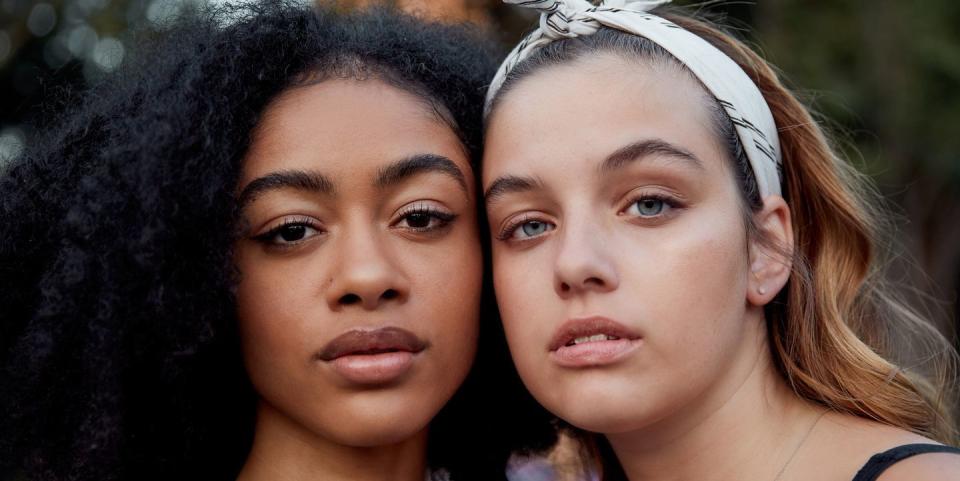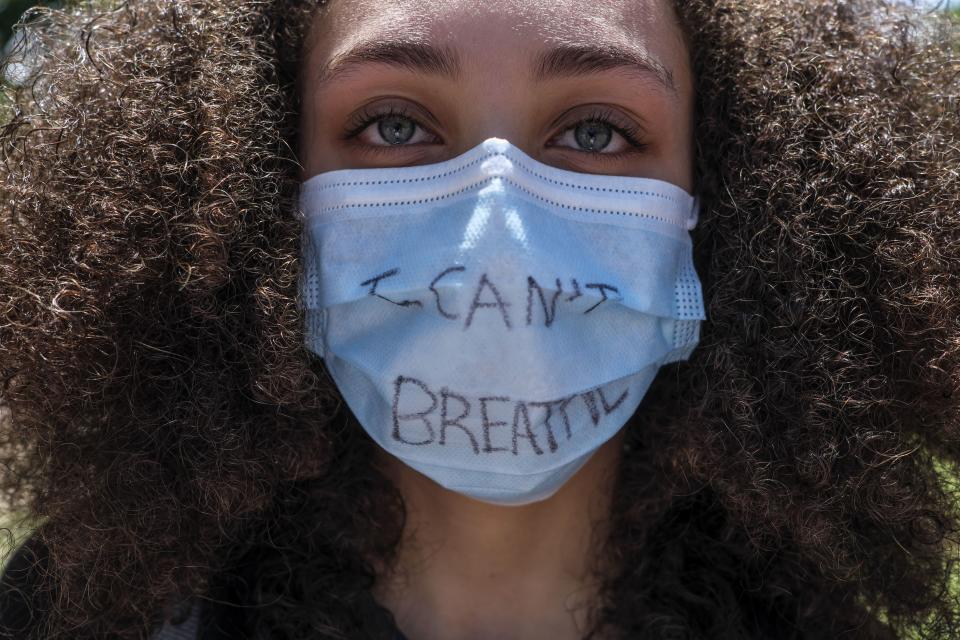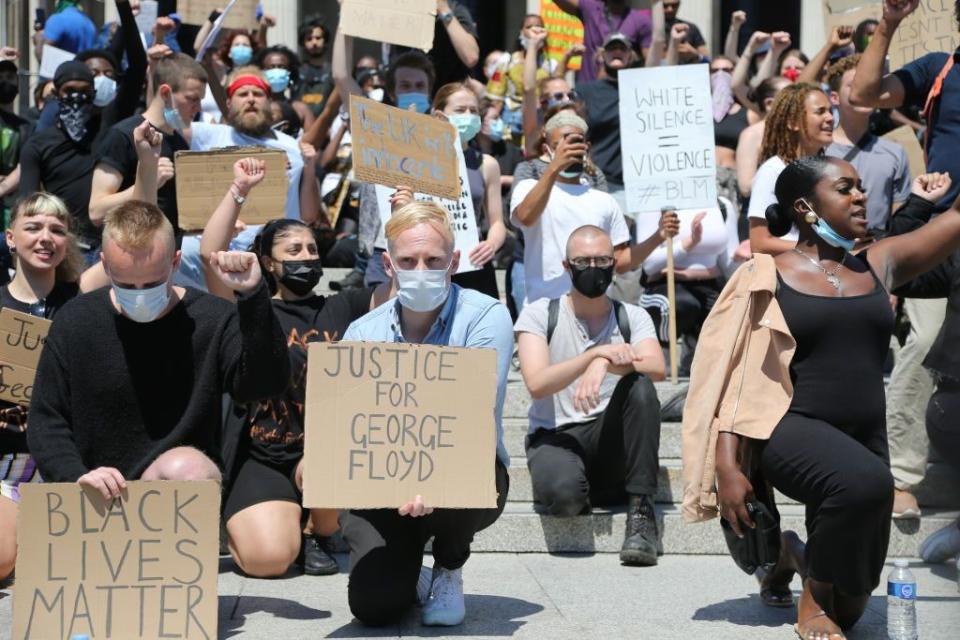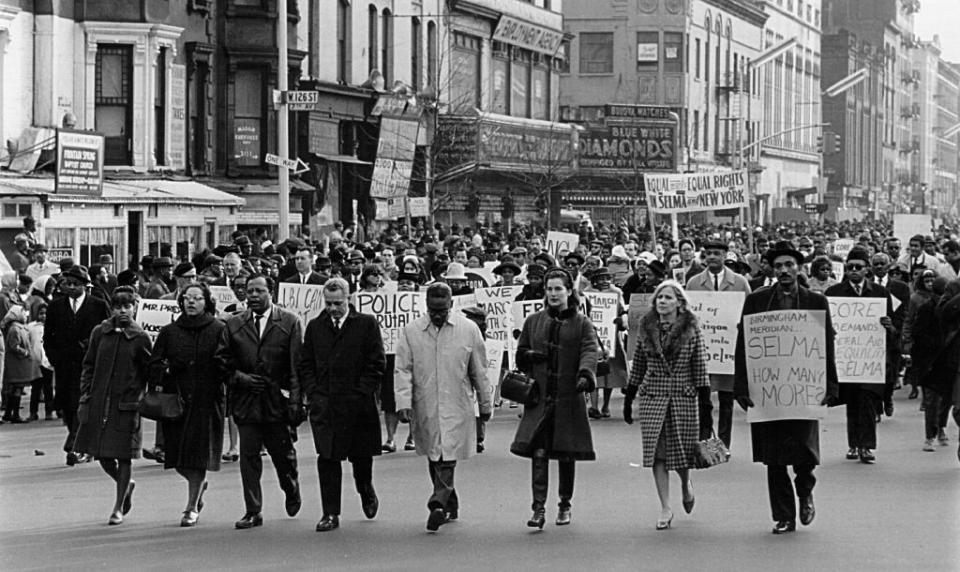What White Allyship Means To Me In The Fight For Racial Equality

Talking about racism isn’t easy.
I’ll be honest, speaking openly about it isn’t something I’ve always willingly done. I am mixed race. Half black, half white, which brings with it its own nuanced set of cultural experiences. I know how uncomfortable and how loaded these conversations can be; how people squirm when you bring up inequality, how people look to see if you're the right person to even be having the conversation with in the first place. But the current situation has made me realise that racism defies your conversational discomfort. The pain being caused is intolerable. And we need to live in our discomfort, confronting it over and over again, until something changes.

Tears rolled down my face this weekend as I watched the same video that we've all seen, of George Floyd being squeezed of his last flicker of life as he pleads to hold on to it. This isn’t the first video of its kind in existence. As a society, we’ve been strangely fascinated with them. There’s the footage of Ahmaud Arbery, the unarmed 25-year-old black man going for a jog around his neighbourhood, being shot by Gregory McMichael and his son, Travis, back in February. And I’ll never forget how, 20 years ago, the CCTV footage of 10-year-old Damilola Taylor’s final living moments appeared on every news channel; screenshots from the video plastered across the front pages, depicting him leaving Peckham Library one afternoon before he was stabbed 15 minutes later. I was eight at the time, and still the memory endures.
But social media has seen both the proliferation of the footage globally and brought people into the conversation who otherwise might not have read the papers or turned on BBC News. I’ve watched an outpouring of grief and emotion on Instagram in a way I have never seen before. At times, it’s been seriously uncomfortable. Sometimes, it’s seemed insincere. And others, it’s been so poignant it’s evoked a physical reaction from me while reading. But that's OK. Because the more people we pull out of their comfort zones and into the debate, the more likely we'll start seeing a shift in attitudes. And that, of course, has got to be the long-term goal. To effect meaningful change requires everyone to understand why the changes need to happen.

Firstly, we know that internet pressure can work to speed up the process of justice. Two months after Arbery was killed, the video footage was leaked online. As a result of the outcry that followed, his killers were finally arrested. Without that public campaign, it’s likely they would have gone free.
And more than that, through social media, I've seen also seen the formation of a new community. Not simply a collection of grief-stricken people of colour mourning yet another loss, but a steady embrace of the Black Lives Matter movement by people who would previously have been too nervous to utter the words, or worse yet, ignored it entirely. With every new post of support, comes a message that it's OK to share your feelings. It's OK to enter the conversation, regardless of the colour of your skin, it's OK to be angry, to ask questions, to share the outrage. It’s more than OK – it’s necessary.
A post shared by QUENTIN MONGE (@mongequentin) on May 31, 2020 at 12:42am PDT
And it's made the conversation trans-territory too. While police brutality in the US might have been the match to light the flame on this occasion, we're talking to each other about the implications of racial bias on our own soil. In recent months, for example, it has been proven that black, Asian and minority ethnic (BAME) people living in England are 54 per cent more likely to be fined under coronavirus rules than white people, according to analysis by Liberty Investigates and The Guardian.
A poll by ICM also showed that BAME people in the UK are three times more likely to have been denied entrance to a restaurant, bar or club, while 38 per cent of those from ethnic backgrounds have been wrongly suspected of shoplifting in the last five years, compared with 14 per cent of white people. And a study last year by the Trade Union Congress revealed over 70 per cent of BAME workers have experienced racial harassment at work here in Britain.
This needs all of our attention.
For people of colour, experiencing, talking about and fighting against racism is nothing new. It’s something black people are raised knowing they will confront. And it's exhausting. Londoner Michael, 33, told me today that he and his girlfriend have already spoken about the conversation they will need to have with their mixed race son. ‘The talk' as he puts it, 'in which your parents tell you that you will have to work harder as a black person and what the police will think of you'. His son is only two months old.

This makes me think of my cousins, aged three, four and six, and I worry what their lives will be like, as they grow up black in a world unprepared to shield them from prejudice. I wonder if their parents have had ‘the talk’ with them, too.
For non-racist or racially agnostic white people, it can still feel easy to be quiet. Either because racism isn't perceived to be part of their daily experience or because they're worried it's not their conversation to have. I’ve spoken a lot about this with friends recently; that feeling of helplessness, not being sure what to say. What came out of those conversations was a simple solution: just stand up for what is right. And if it takes a person of colour to sanction your entrance into the debate, consider this it.
You don't have to do it on social media, but be open to having these conversations about race and privilege. Educate yourself on the history of systematic oppression and the ongoing struggle for racial equality. Listen and empathise.
A post shared by Lost In History (@historicaldarlings) on Jun 1, 2020 at 2:18am PDT
After all, empathy does not require you to share an experience exactly. Empathy does not require you to be a specific race, age or gender. It does not require a certain social status. Empathy requires you to learn about someone’s situation, put yourself in their shoes, and imagine how they would feel. And then act on that feeling.
‘Ask your black friends how they are’ is a quote I’ve seen doing the rounds. And it's a good one. 'It’s an emotional time,’ Michael explains. It helps to know that other people are trying to understand. ‘Posts like these can help elicit conversation, which may be awkward or difficult,’ says Aicha, 28. ‘I can count on one hand the amount of non-black friends who’ve approached me about race. It’s a good thing if you’re feeling uncomfortable about starting that conversation, because it shows there’s an elephant in the room,’ she adds.
It shouldn't offend you as more and more white people take up the mantle of debate. It's been the responsibility of black people to feel the burden, the pain and the weight of the responsibility alone for too long. Yes, white people may never fully understand the entire emotional depth of the issue, but it's important to try.

Or, as my (white) friend Caitlin, 27, put it: 'I believe now is the time for us to give the voice to black people 100 per cent – but at the end of the day, white people are the ones controlling the narrative and who gets to speak, so it's our duty to amplify black voices whenever we can.'
Now we’ve started talking about race, we shouldn’t stop. Let’s keep sharing our experiences. Each conversation might feel insignificant; a drop in an overwhelming ocean. But with every word spoken, comes hope. And that hope builds and swells into powerful waves of change. And it’s all of our duty to keep that change in motion.
To learn how to be an ally to those who need it, see Mireille Charper’s excellent guide here.
To support charities and organisations helping those in need, we've rounded up some of the best to engage with here.
Like this article? Sign up to our newsletter to get more articles like this delivered straight to your inbox.
In need of more inspiration and thoughtful journalism? Subscribe to ELLE's print magazine now and pay just £6 for 6 issues. SUBSCRIBE HERE
You Might Also Like

